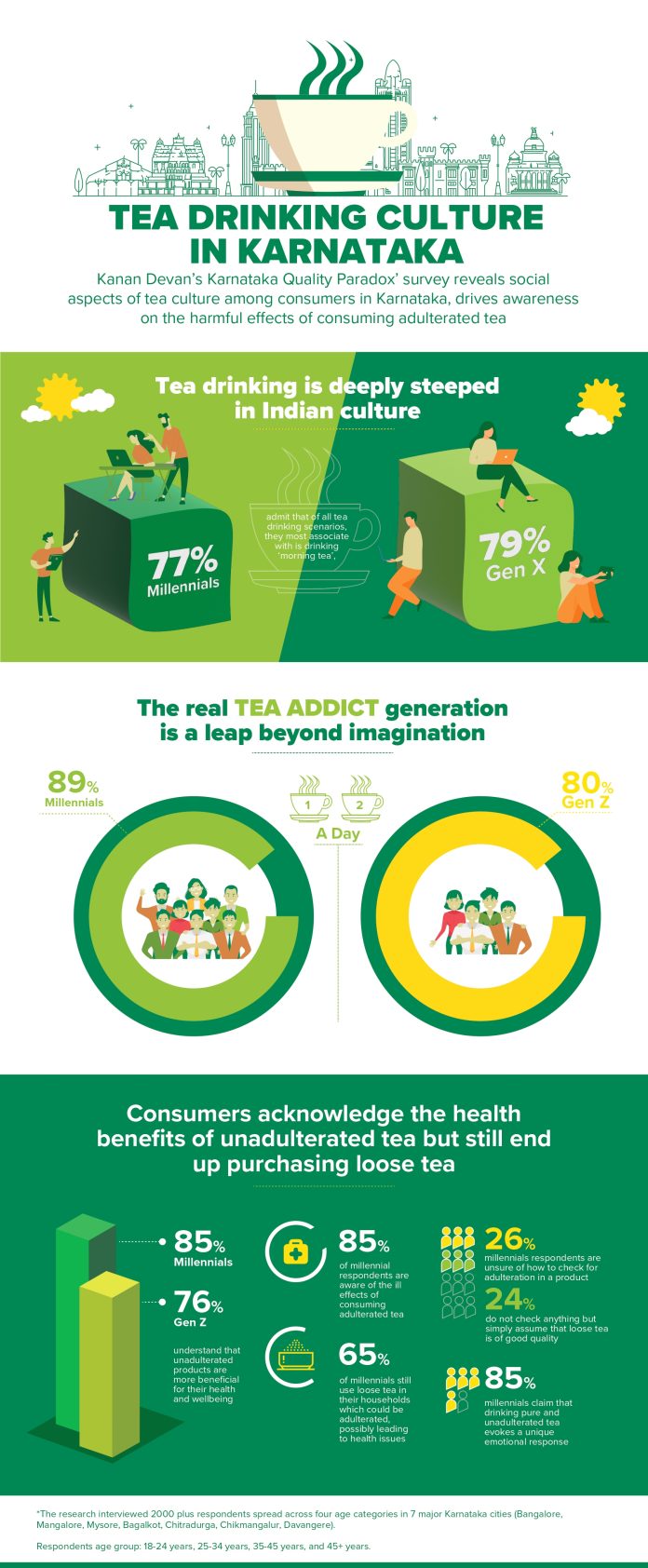- Karnataka’s leading tea Kanan Devan’s Karnataka Quality Paradox’ survey reveals interesting social aspects of tea culture among consumers in Karnataka
- Drives awareness on the harmful effects of consuming adulterated tea
Highlights:
- The research interviewed 2000 plus respondents across four age categories in equal proportions spread across 7 major Karnataka cities (Bangalore, Mangalore, Mysore, Bagalkot, Chitradurga, Chikmangalur, Davangere)
- 89% of millennials and 80% of Gen Z routinely drink 2 or more cups of tea a day
- 75% of respondents feel the situation they most associate with tea drinking is their ‘morning tea’ with family members
- 77% of respondents are aware of the ill effects of consuming adulterated tea, but 65% still use loose tea in their households which could be adulterated, possibly leading to health issues
April 27th 2022: As the second largest tea producing country in the world, for centuries ‘chai’ has steeped deeply into our culture as the nation’s favourite refreshment. There’s no ignoring the fact that the ritual of enjoying tea as a beverage transcends boundaries, cultures and age groups. Even though there are many occasions which Indians consider incomplete without a cup of tea, most Indians associate tea with its social aspect.
With an aim to bring out the social, cultural and dietary shifts witnessed among consumers when it comes to their food choices, Tata Tea Kanan Devan, Karnataka’s leading tea brand has recently revealed interesting findings on tea culture in the state through the ‘Karnataka Quality Paradox’ survey.
The extensive survey undertaken across major cities in Karnataka like Bangalore, Mangalore, Mysore, Bagalkot, Chitradurga, Chikmangalur and Davangere, gives key insights on the need to raise awareness on harmful effects of adulterated tea and encourage customers to opt for trusted quality tea that is pure and natural. Commissioned by Tata Tea Kanan Devan, the ‘Karnataka Quality Paradox’ surveyed respondents in four age categories of 18-24, 25-34, 35-45, and 45+, in equal proportions and shares some of the below key findings bringing out Karnataka’s tea consumption and preference patterns:
- Data indicates how deeply steeped tea drinking is in Indian culture
When it comes to consuming tea, consumers associate tea drinking to specific situations in everyday life. According to the survey:
- More than three-quarters of millennials (77%) & Gen X (79%) admit that of all tea drinking scenarios, they most associate with is drinking ‘morning tea’, with their tea routine dominated by ‘morning tea’ with family members
- The real ‘Tea addict’ generation is a leap beyond imagination
Insights of the survey prove Tea is deeply entrenched as part of daily lives of millennial population of Karnataka:
- Millennials seem to be most fond of tea with 89% of Karnataka’s millennials routinely drink 2 or more cups of tea a day, and Gen Z constitute 80% of tea drinkers
(Those between 18 and 25 have been referred to as Gen Z, those between 26 and 35 have been addressed as millennials or Gen Y, and those between 36 and 45 have been called Gen X’)
- Consumers acknowledge the health benefits of unadulterated tea but still end up purchasing loose tea
When it comes to knowledge on unadulterated food products, a high level of awareness is seen among millennials. Despite this however, actions taken don’t seem to reflect the knowledge. This behaviour is more prevalent when purchasing everyday food items like tea, as per data that reveals:
- 84% of millennials and 76% of Gen Z understand that unadulterated products are more beneficial for their health and wellbeing
- Although 76% of millennial respondents are aware of the ill effects of consuming adulterated tea, 65% still use loose tea in their households which could be adulterated, possibly leading to health issues
- More than a quarter of millennial respondents (26%) are unsure of how to check for adulteration in a product and 24% do not check anything but simply assume that loose tea is of good quality
- More than four in five millennials (84%) of every generation claim that drinking pure and unadulterated tea evokes a unique emotional response
(Those between 18 and 25 have been referred to as Gen Z, those between 26 and 35 have been addressed as millennials or Gen Y, and those between 36 and 45 have been called Gen X’)
Elaborating on the survey findings, Puneet Das, President, Packaged Beverages, India & South Asia, Tata Consumer Products Limited, said, “Karnataka Quality Paradox aims to bring out key insights of tea consumption and thereby educate consumers on the need to consume quality tea, in order to encourage them to opt for that is pure and natural. The need of the hour is making conscious decisions when it comes to avoiding adulterated food products and moving to packaged brands. In addition to this, it is also vital that consumers are aware of all the necessary certifications and hallmarks that assure them of the quality of product being purchasing. Tata Tea Kanan Devan with its rich expertise in understanding regional taste palettes, urges tea drinkers to be aware of product purchase for better well-being, without compromising on taste”.
Kavita Devgan, Nutritionist, speaking about the Tata Tea Kanan Devan survey findings said, “The beneficial value of tea as part of one’s daily diet is well-known. However, despite consumers’ high awareness on the harmful effects of adulterated tea, most end up purchasing loose tea. The Tea Board of India recommends using tea with no colour additives used, as such adulterated tea could pose great health risks. The Quality Paradox Survey data interestingly reveals that 77% of respondents are aware of the ill effects of consuming adulterated tea, but 65% still continue to use loose tea in their households which could be adulterated, leading to health issues. This can be easily prevented by opting for pure and natural tea from well-known brands in the market that are trustworthy”.




















